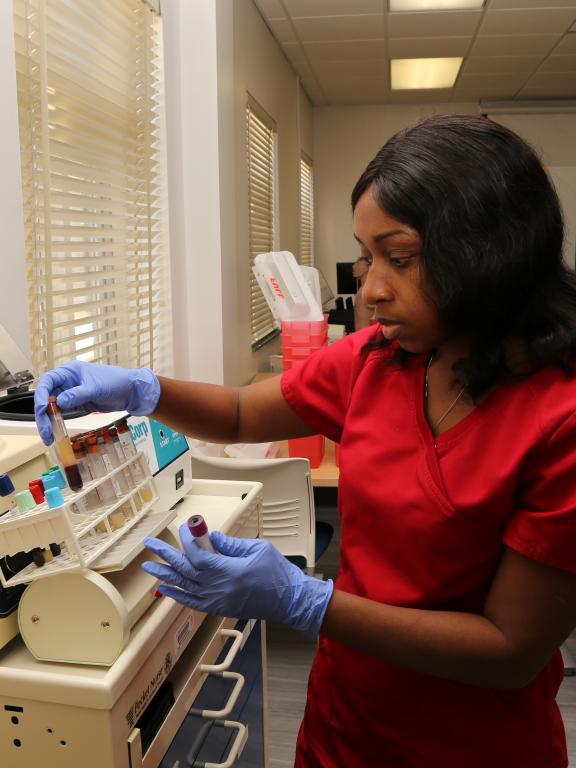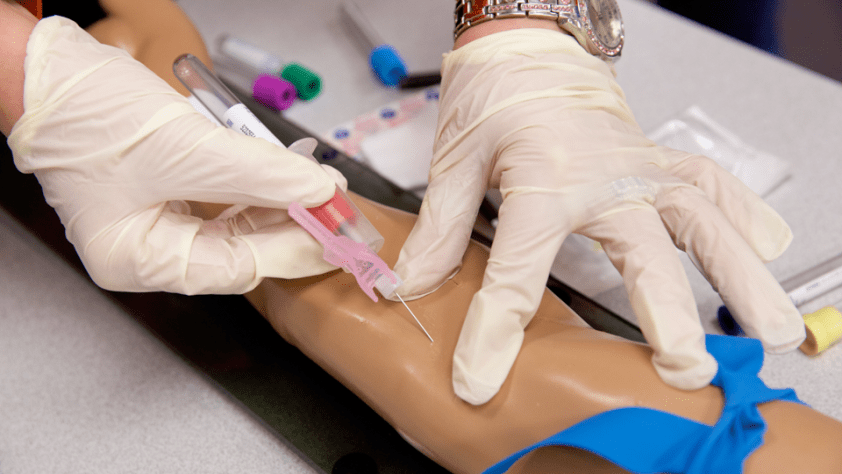The Course to Accreditation: Comprehending the Phlebotomy Training Course Journey and Its Value
As you consider the path to certification in phlebotomy, it's crucial to comprehend the function you'll play in health care. Your training will cover important skills, from blood collection techniques to patient interaction. Each element of the program prepares you for the obstacles ahead. But just what does the trip involve, and why is certification so essential for your future career? Allow's explore these concerns further.

The Function of Phlebotomists in Healthcare
Phlebotomists play an important role in the health care system, working as the essential link between people and vital analysis testing. You'll do blood draws, making certain examples are accumulated accurately and safely. Your know-how aids in diagnosing medical conditions, checking health, and assisting treatment decisions.
In your everyday interactions, you'll need to develop trust fund with people, making them feel comfy during what may be a demanding experience. You are accountable for classifying and dealing with samples carefully to stop contamination or mistakes, which might influence examination outcomes.
Past this, you'll usually function alongside doctors and nurses, connecting crucial information concerning clients' problems. Your role is fundamental in maintaining the workflow in health care setups, making sure prompt and exact results. By grasping your abilities, you add meaningfully to client treatment, making you a crucial component of the medical group. Accepting this responsibility is crucial to your success as a phlebotomist.
Introduction of Phlebotomy Training Programs
When discovering phlebotomy training programs, you'll find numerous kinds created to fit different timetables and finding out designs. Each program helps you develop important skills like blood collection and person communication. Recognizing these alternatives is crucial to selecting the best path for your career.
Types of Educating Programs
A number of kinds of training programs are offered for those looking to end up being skillful in phlebotomy. Furthermore, some healthcare facilities and clinics supply on-the-job training programs, offering functional experience while you discover. Whatever path you select, each program aims to furnish you with the essential skills for an effective phlebotomy career.

Key Skills Created
Grasping phlebotomy needs a collection of crucial skills that are developed via thorough training programs. You'll find out technological abilities like proper blood vessel option, needle insertion, and blood collection techniques. These hands-on techniques ensure you can do procedures securely and efficiently. In addition, communication abilities are essential; you'll need to engage with people, describe treatments, and put them at convenience. Comprehending composition and physiology is crucial, also, as it helps you situate blood vessels and recognize the body's response to blood draws. Lastly, you'll acquire expertise of safety and security methods and infection control, ensuring you preserve a sterilized atmosphere. Each of these abilities is vital for your success as a licensed phlebotomist, making you a beneficial property in any health care setting.
Key Components of a Phlebotomy Program
In a phlebotomy program, you'll focus on important topics that lay the groundwork for your future job. You'll take part in hands-on training that allows you to use what you have actually found out in real-world settings. Both the core curriculum and functional experience are crucial for your success as a phlebotomist.
Curriculum Review
While pursuing a phlebotomy training program, you'll encounter a curriculum created to outfit you with basic skills and understanding. Phlebotomy Training Course. This curriculum typically consists of anatomy and physiology, focusing on the circulatory system and comprehending blood parts. You'll additionally discover various kinds of blood collection methods, consisting of venipuncture and capillary leak techniques
Additionally, infection control and security procedures are crucial parts, guaranteeing you understand exactly how to preserve a clean and sterile setting. You'll research patient interaction, highlighting communication and compassion, which are important for relieving client anxiousness. Ultimately, honest and lawful considerations will certainly be resolved, preparing you for real-world obligations. This foundational knowledge will certainly allow you to stand out as a phlebotomist and provide high quality care in clinical settings.
Hands-On Training Experience
Obtaining hands-on experience is a vital component of your phlebotomy training program. This sensible training enables you to apply what you have actually found out in a real-world setting, enhancing your abilities and self-confidence. You'll practice venipuncture strategies, find out just how to deal with different kinds of specimens, and get acquainted with the equipment utilized in the area. Under the support of experienced trainers, you'll improve your abilities, ensuring you're planned for any kind of situation you may deal with.
Additionally, you'll get the chance to interact with patients, which is vital for establishing your communication abilities. This combination of technological proficiency and social skills is vital for your success as a qualified phlebotomist. Inevitably, hands-on training is where theory satisfies practice, solidifying your expertise and preparedness for qualification.
Accreditation and Licensing Needs
Before you can begin your profession in phlebotomy, it is vital to understand the qualification and licensing requirements that vary by state. Many states require phlebotomists to hold a qualification from a recognized organization, such as the National Phlebotomy Organization or the American Culture for Medical Pathology. These certifications generally entail passing an exam that evaluates your expertise and abilities in the field.
In enhancement to certification, some states have specific licensing requirements. You may need to finish a certain variety of hours in professional method, send evidence of training, or go through a history check. It is essential to research your state's laws to see to it you right here meet all necessary requirements.
Staying educated concerning these requirements not just helps you safeguard a position however likewise enhances your credibility as a professional. By meeting these demands, you'll be well on your method to a successful profession in phlebotomy.
Hands-On Training and Practical Experience
Hands-on training and practical experience are vital parts of your phlebotomy education, as they allow you to use theoretical knowledge in real-world situations. Throughout your training, you'll take part in supervised venipuncture, learn appropriate strategies, and come to be knowledgeable about various blood collection devices. This straight participation is crucial for developing your self-confidence and refining your skills.
You'll function very closely with seasoned specialists who can direct you via the nuances of client communication and sample handling. Each session not just reinforces your understanding however also prepares you for the hectic atmosphere of health care setups.
In addition, several programs incorporate professional turnings, allowing you to experience diverse setups, from medical facilities to outpatient centers. This exposure aids you adjust to various challenges and patient requirements, ensuring you're well-prepared for your future function. Accept these possibilities, as they're vital to coming to be a competent and caring phlebotomist.
Difficulties Encountered During Training
While gaining hands-on experience is important, it is necessary to recognize the obstacles that can arise throughout your phlebotomy training. You could experience anxiety when executing procedures on real individuals, specifically if you're new to the setting. The pressure to get every little thing right can be frustrating. Additionally, mastering the skills required for blood draws takes method; you may find this deal with method at first.
Time monitoring can additionally be a hurdle, as harmonizing concept, useful sessions, and personal commitments can really feel intimidating. You may face varying learning speeds among your peers, bring about feelings of self-doubt if you assume you're falling back. Adjusting to the various individualities of instructors can be difficult, as each might have an one-of-a-kind teaching design.
Acknowledging these challenges early on can prepare you for success and aid you create durability throughout your training journey.
Profession Opportunities After Certification

As you obtain experience, you may even take into consideration focusing on areas like pediatric or senior citizen phlebotomy, accommodating particular person needs. Some phlebotomists choose to progress their jobs by coming to be laboratory technicians or going after more education and learning in health care fields.
Additionally, your certification can cause functions in training or monitoring new phlebotomists, enabling you to share your understanding. With the medical care sector continually growing, useful reference your skills will constantly remain in need, paving the way for a steady and fulfilling career. Welcome the chances awaiting you!
Frequently Asked Questions
What Is the Typical Period of a Phlebotomy Training Program?
Phlebotomy training programs commonly last around 4 to eight weeks. You'll involve in hands-on method, class guideline, and on-line understanding. Completing this training prepares you for certification and a satisfying occupation in healthcare.
Are Online Phlebotomy Courses Available?
Yes, online phlebotomy programs are readily available. They provide adaptability and comfort, allowing you to research at your very own rate. Simply verify the program is approved to satisfy accreditation demands and acquire beneficial abilities for your profession.
Just How Much Does Phlebotomy Training Normally Cost?
Phlebotomy training typically costs between $700 and $2,500, relying on the program and place. You must take into consideration aspects like course length, consisted of materials, and hands-on experience when selecting the best training for you.
What Prevail Prerequisites for Phlebotomy Training?
Common prerequisites for phlebotomy training usually include a senior high school diploma or GED, booster shots, and a background check. Some programs might additionally need basic medical care understanding or accreditations, guaranteeing you're planned for hands-on training.
Can I Function While Completing My Phlebotomy Training?
Yes, you can work while completing your phlebotomy training. Numerous students balance work with their researches, but ensure to handle your time efficiently to assure you meet both job and training commitments effectively.